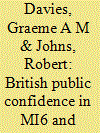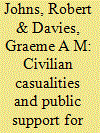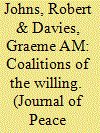|
|
|
Sort Order |
|
|
|
Items / Page
|
|
|
|
|
|
|
| Srl | Item |
| 1 |
ID:
126540


|
|
|
|
|
| Publication |
2013.
|
| Summary/Abstract |
This article reports on an audience costs experiment embedded into a survey of the British public (N = 2235). We extend previous research into audience costs in three main directions. First, we provide clear and direct evidence that they exist for a second-order democratic power, the United Kingdom. Second, we show that the extent of audience costs varies, and at times substantially, along with features of the crisis situation that have not been examined empirically in this context before. In particular, the type of crisis strongly influences public reactions both to bluffing in general and to the wisdom or otherwise of escalating crises before backing down. While audience costs do appear to exist for a UK Prime Minister, he or she cannot inflate them by moving up the escalation chain. Rather, a limited use of force tends to mitigate these costs among the British public because it appears to them a more consistent strategy. Third, we show that public disapproval of a failed bluffing strategy is stronger among the more politically engaged, increasing the likelihood that audience costs will be paid at the ballot box.
|
|
|
|
|
|
|
|
|
|
|
|
|
|
|
|
| 2 |
ID:
116164


|
|
|
|
|
| Publication |
2012.
|
| Summary/Abstract |
There are considerable concerns about public perceptions of intelligence stemming directly from the highly politicized nature of intelligence estimates in the run-up to the US-UK invasion of Iraq in 2003. In this article we use a new public attitudes dataset to provide the first ever analysis of British public confidence in MI6 and Government use of intelligence. The article demonstrates that the public have relatively high confidence in the intelligence produced by MI6 but are extremely sceptical about how the Government will present that intelligence. Using an ordered logit model this article then examines the factors that influence public perceptions of both intelligence and Government, finding that women are a lot less confident in both the intelligence services and government presentation of intelligence than men, suggesting that this might help explain gender differences in support for military action. The study also demonstrates that party identifiers and Catholics have very low confidence in the intelligence produced by MI6. The study shows that public confidence in both government and intelligence has a strong effect on support for preventive military action against terror camps, suggesting that the intelligence agencies need to avoid being contaminated by political agendas as much as possible if the intelligence case for future military actions is to be supported by the public.
|
|
|
|
|
|
|
|
|
|
|
|
|
|
|
|
| 3 |
ID:
163453


|
|
|
|
|
| Summary/Abstract |
In contrast to the expansive literature on military casualties and support for war, we know very little about public reactions to foreign civilian casualties. This article, based on representative sample surveys in the United States and Britain, reports four survey experiments weaving information about civilian casualties into vignettes about Western military action. These produce consistent evidence of civilian casualty aversion: where death tolls were higher, support for force was invariably and significantly lower. Casualty effects were moderate in size but robust across our two cases and across different scenarios. They were also strikingly resistant to moderation by other factors manipulated in the experiments, such as the framing of casualties or their religious affiliation. The importance of numbers over even strongly humanizing frames points toward a utilitarian rather than a social psychological model of casualty aversion. Either way, civilian casualties deserve a more prominent place in the literature on public support for war.
|
|
|
|
|
|
|
|
|
|
|
|
|
|
|
|
| 4 |
ID:
134455


|
|
|
|
|
| Summary/Abstract |
Studies of public support for war highlight the importance of context. Most people do not simply support or oppose the use of force but instead assess its merits depending on various aspects of the situation. One such aspect is the extent of international backing – whether from individual states or supranational organizations – for military action. This backing may be active, notably through the contribution of troops, or more a passive matter of endorsement or authorization of action. In this article, a survey experiment embedded in a major internet survey of British foreign policy attitudes (N = 2,205) is used to explore how international backing affects public support for military action. Britain’s military potential and recent history make it an obvious case study here. Both active and endorsement backing prove to have separate and significant positive effects on support. Importantly, the absolute number of troops involved matters far less than the proportion of total troop numbers to be contributed. And the perceived strength of the enemy predicts support only when the British are to contribute a large proportion of total forces. Predispositional variables are used to investigate the sources of the experimental effects but with little success: the impact of international backing proves remarkably consistent across the sample.
|
|
|
|
|
|
|
|
|
|
|
|
|
|
|
|
|
|
|
|
|